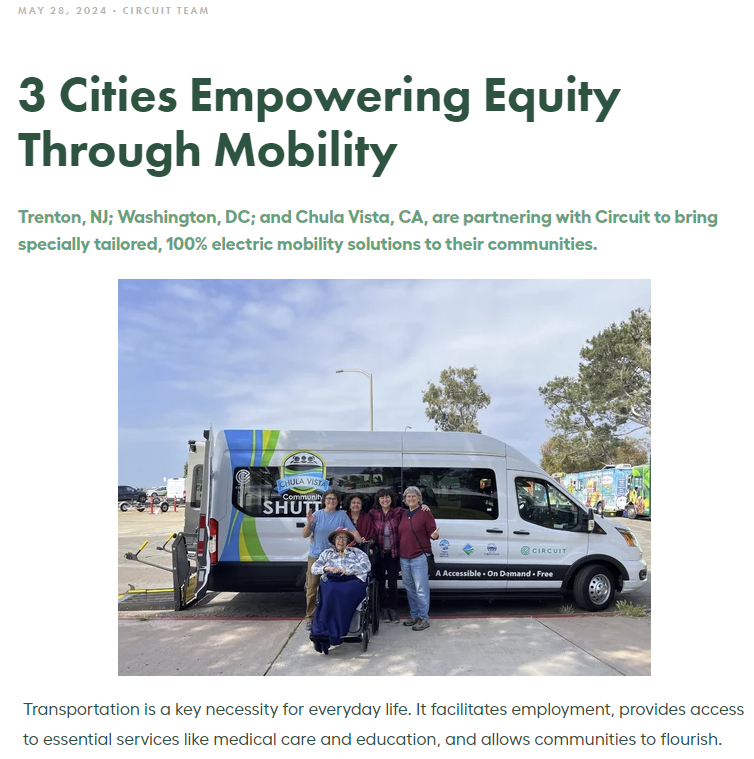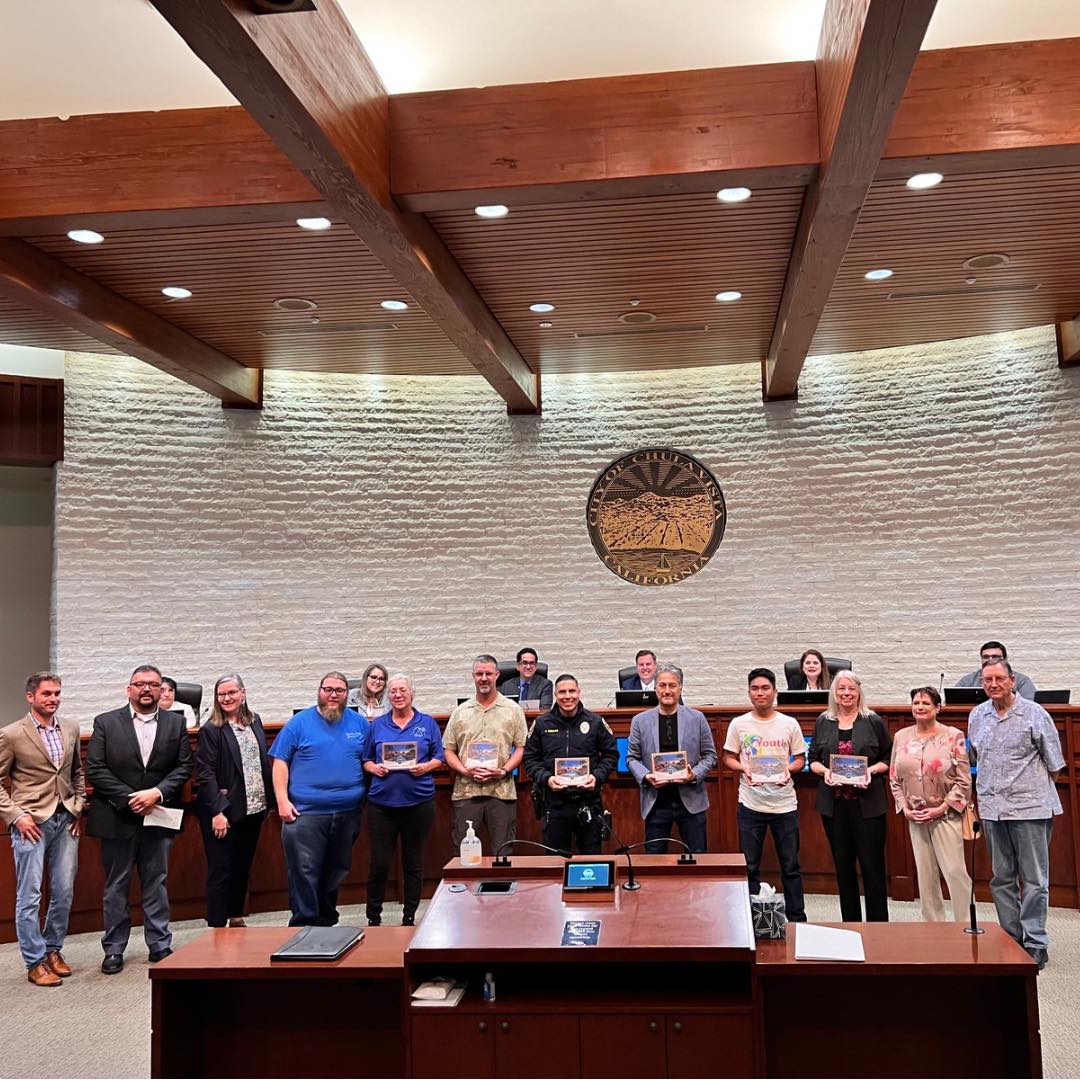CCDC Featured in Times of San Diego
CCDC Featured in San Diego Business Journal
CCDC in the News
- CCDC has been featured in the Times of San Diego:
- https://timesofsandiego.com/tech/2024/08/13/chula-vista-announces-expanded-shuttle-service-for-all-adults/
CCDC has been featured on NBC:
https://www.nbcsandiego.com/news/local/all-aboard-chula-vista-expands-shuttle-service-everyone/3597108/
CCDC Featured at RideCircuit.com: “3 Cities Empowering Equity Through Mobility”
CCDC his highlisted in the “3 Cities Empowering Equity Through Mobility” article at ridecircuit.com. Click the following link to read more.
https://www.ridecircuit.com/blog/empowering-equity-through-mobility
Chula Vista City’s 2024 Sustainability Champion Award
CCDC appeared before the Chula Vista City Council and was named its corporate sustainability champion.
For more info:
CCDC in San Diego Union-Tribune: “St. Paul’s Senior Services reopens apartments after $20M in repairs”
CCDC appears in the SD Union Tribune. Use the following link to read more.
“St. Paul’s Senior Services reopens apartments after $20M in repairs”
CCDC in San Diego Union-Tribune
CCDC appears in the SD Union Tribune. Use the following link to read more.
CCDC in San Diego Union Tribune: “Seniors struggle to find affordable housing in S.D.”
See original article at San Diego Union Tribune’s website: https://enewspaper.sandiegouniontribune.com/infinity/article_share.aspx?guid=a1bd0310-aa90-4686-8a10-4a0fdf3ef994
By Lauren J. Mapp
It’s only 578 square feet, but Connie McKrieth says her downtown San Diego studio apartment feels spacious and homey compared to her last residence: a U-haul van she rented and lived in for nine months last year.
The van had become the 58-year-old’s only option after years of medical care for cancer depleted her savings.
For nearly two decades, McKrieth worked for the Los Angeles County University of Southern California Medical Center as an administrative specialist. After that, she worked for the City of Los Angeles, then in the UCLA Medical School admissions office. Because of her health issues, she retired early and now lives on about $1,800 a month through her pension and Social Security payments.
Prior to the pandemic, she supplemented her income driving for Uber and Lyft, but that ended when she had debilitating side effects from the novel coronavirus. As her rent increased from $1,200 to $1,900 a month, money became tighter and she relied on credit cards to pay for rent and groceries. Eventually, she rented a U-Haul van so she could continue to live with her dogs. Finally, in February, she moved into her own apartment.
“I never thought that I would be one of the ones that I used to battle and fight for,” she said.
As San Diego County inches closer to having more than a million residents who are 55 and older by 2030, the region’s politicians, policymakers, nonprofits and advocates are sounding a clarion call about the emerging need for more affordable housing for seniors like McKrieth.
The San Diego region has been ranked as the second most expensive metro area in the nation. In a SmartAsset review of living wage data from the Massachusetts Institute of Technology, people living in the San Diego, Chula Vista and Carlsbad metro area need a post-tax annual salary of $79,324 to live comfortably, putting the region just behind the San Francisco metro area.
U.S. Census Bureau data shows that nearly 61 percent of all homeowners in San Diego County are older adults. Of the 676,879 homeowners in the region, 412,421 are age 55 and older.
Many older adults may benefit from being longtime homeowners, but it can be difficult to enter the housing market as a new buyer in an expensive region like San Diego, where the median home price is $805,000, while living on a retirement or Social Security income.
And with the rising cost of rent, that means more older adults — especially those who are retired and rely solely on Social Security — are at risk of becoming housing insecure or unhoused.
Older adults make up one of the fastest growing groups of unhoused people in San Diego County. The 2022 annual homeless count conducted by the Regional Task Force on Homelessness found that 25 percent of the homeless population was age 55 or older.
Housing subsidy programs
To prevent older adults from becoming homeless, advocates say the region must offer financial assistance, such as housing subsidies, which afford seniors the opportunity to age in place longer by alleviating the burden of rising housing costs.
A 2021 survey by Serving Seniors found that more than half of seniors polled said a subsidy of $300 or less would enable them to meet their rent costs and avoid becoming homeless.
Soon, the county will launch its inaugural housing subsidy program for people 55 and older. Approved by the Board of Supervisors in February of last year, those selected for the pilot will receive a subsidy of $500 monthly for 18 months. The county has set aside $2 million in its budget for the program.
Board of Supervisors Vice Chair Terra Lawson-Remer said forecasts estimating the county’s population of people age 55 and older would grow to more than 1.1 million people by 2030, paired with data showing increased numbers of unhoused seniors, led the county to develop the subsidy pilot program.
“Research indicated that subsidies were going to be an effective intervention” Lawson-Remer said. “There’s basically a gap in senior funding, and that if we were able to bridge that gap, we would be able to keep people housed.”
The county reports that as of April 28, 2,195 applications have been submitted for the housing subsidy program. Of those, 222 people will be selected as recipients over the next few weeks.
A date for launching the program has not yet been finalized, Lawson-Remer said, but an evaluation framework to track its impact has been developed by the county’s Office of Evaluation, Performance and Analytics.
“A pilot really requires a robust monitoring evaluation program,” she said. “If we see a significant difference in the rate of homelessness between the people who received the subsidy versus those that don’t, I think that would be a massive success.”
But the county’s program will not be the first of its kind in the region.
Last fall, Serving Seniors received a $350,000 grant from the Community Congregational Development Corp. to fund a two-year, rental subsidy program. The program’s initial 21 clients — Chula Vista residents who range in age from 63 to 82 — each receive $300 a month, as well as meals and access to other support resources.
“A lot of people are saying that it is life saving,” said Laurie Orange, CCDC director and corporate secretary. “That $300 a month is making an enormous difference in their being able to pay rent and also eat and have their medical expenses covered.”
The San Diego Housing Commission provides 10,151 Section 8 housing vouchers to heads of low-income household who are age 55 or older to help subsidize the cost of their rent. SDHC Executive Vice President of Strategic Initiatives Lisa Jones said that about a third of those vouchers go to people or households who previously experienced homelessness.
In addition to the Section 8 housing vouchers, SDHC also provides rental subsidies to residents through the Housing Instability Prevention Program, which was created and funded through a San Diego City Council allocation of $3.57 million. The organization’s COVID-19 Housing Stability Assistance Program, which was funded through federal and state funding to address the heightened need caused by the pandemic, concluded last August.
Building more
affordable housing
San Diego County reports that the income needed to cover the cost of daily necessities in the region is more than two times the average Social Security income.
On average, seniors locally receive $1,565 in their monthly Social Security checks, which is thousands of dollars lower than the average cost of living for both renters ($3,455) and homeowners ($3,321).
A 2021 survey shows that 9.5 percent of San Diegans age 65 and older are living under the federal poverty level of $14,580. County data shows 23.8 percent living under $29,160. Of seniors age 65 and older in the county, 18.9 percent remain in the labor force.
Perhaps the most important factor when it comes to housing the region’s older adults is a need to develop more housing for people of all income levels and ages, said Colin Miller, SDHC senior vice president of housing finance and property management.
Without more housing across the board, people with higher incomes inevitably end up “renting down,” Jones said, which squeezes people with lower incomes out of the market and further eats up the availability of affordable housing.
“If we could build 800 units today, they’d be filled up in a matter of weeks, so the demand is definitely there for affordable senior housing,” Miller said.
With land and funding for affordable housing limited, a key element in solving the region’s lack of housing is increasing urban density by developing taller apartment buildings.
Miller added that it’s best when those structures have housing to serve a mix of income levels, something that has been incentivized by the city’s inclusionary housing ordinance.
“That helps to create affordable housing in San Diego, as well as integrate it with traditional market rate housing, which has been proven to be a benefit for all parties,” he said.
Aside from a need for more housing overall for San Diego County residents of all income levels, there has been a recent push for more affordable housing specifically for seniors.
One such example is a property under development by the Community Congregational Development Corp. and the Retirement Housing Foundation in Chula Vista. Set to break ground in summer 2024, the new senior affordable housing complex will be located at the corner of Third Avenue and E Street.
Because a city ordinance requires that new apartment buildings in that neighborhood have commercial retail space, Orange said the ground floor will be offered on a rent-free basis to a senior-focused nonprofit to provide support services on site.
During the long months she spent living in the U-Haul van, McKrieth said she felt isolated, lonely and depressed. She also felt a sense of abandonment and betrayal from her community.
“I went through months of no one returning my calls,” she said.
Now that she is settled into her downtown apartment, McKrieth has rebuilt her social circle. She has plenty of space to enjoy her favorite hobbies — spending time with her dogs, content creation for her social media channels and cooking in her spacious kitchen.
“I’m a foodie, definitely a foodie — that’s my therapy,” McKrieth said.
lauren.mapp@sduniontribune.com
See original article at San Diego Union Tribune’s website here: https://enewspaper.sandiegouniontribune.com/infinity/article_share.aspx?guid=a1bd0310-aa90-4686-8a10-4a0fdf3ef994
CCDC in The Star News
The work of CCDC was recently featured in a Star News article quoted below. See links to original article published on The Star News.
“Senior center celebrates makeover”
By Albert Fulcher -06/02/202
The City of Chula Vista held a ribbon cutting on May 30 to showcase the improvements to the Norman Park Senior Center. Over the past few years, the Center received renovations with new flooring, cabinets, a remodeled kitchen, ADA improvements and accessible restroom, a new roof, a second-floor deck, painting, furniture and a new heating, ventilation, and air conditioning system. These improvements, totaling $2.4 million, were funded by Measure P, the half-cent, ten-year sales tax passed by voters in 2016.
In April 2019, using Community Block Grand funds and the City’s General Fund for a total of $132,000, an outdoor fitness area, concrete slab and sail shades were added. The fitness area features low-impact equipment and wheelchair accessible machines.
The most recent renovations at the Center include the addition of pickleball and bocce ball courts and solar lighting for the fitness area for a total cost of $450,000. Funding for these enhancements was provided by the Congregational Community Development Corporation which owns property adjacent to the center. The pickleball court is a multi-sport floor surface allowing the nets to be removed for additional sports use. Pickleball court hours are Monday-Friday, 9 a.m. to 1 p.m. for seniors only and 1 to 5 p.m. for all ages open play; and Saturday from 9 a.m. to 1 p.m. for all ages open play; closed Sunday.
Formally the site of the Chula Vista Library, the Norman Park Senior Center was built in 1963 and named after the City’s first park supervisor Chet Norman. The Center offers a variety of classes, activities and events for the senior population, as well as Meals on Wheels San Diego County headquarters on the second floor.
For more information, visit https://www.chulavistaca.gov/departments/parks-and-recreation/community-centers/norman-park-senior-center .
See original article posted here: https://www.thestarnews.com/senior-center-celebrates-makeover/







